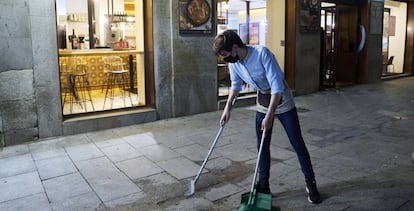Spain’s Supreme Court rules general curfews cannot be imposed under current health laws
The decision comes as Valencia relaxes its coronavirus measures and Madrid sets a midnight closing time for some outdoor dining areas
The Spanish Supreme Court ruled on Thursday that general curfews and restrictions on social gatherings cannot be introduced under the country’s current health laws. The ruling has sweeping implications for Spain’s regions, which are in charge of controlling the coronavirus pandemic in their territories.
When the state of alarm ended on May 9, regional authorities were left without a legal framework to introduce coronavirus restrictions on fundamental rights, such as the nighttime curfew and limits on social gatherings. This meant that regional governments once again had to request approval from the courts to apply such restrictions by citing the 1986 Public Health law. But this legislation has been interpreted very differently by the lower courts. Last year, for example, a lower court in Catalonia approved a 10-person limit on public and private meetings on the same day that another tribunal rejected it.
In a bid to prevent a repeat of this legal chaos, the Spanish government – a coalition of the Socialist Party (PSOE) and junior partner Unidas Podemos – approved in May a royal decree that gave the Supreme Court the final word on coronavirus restrictions. In other words, if a lower court refused to authorize a coronavirus restriction, a region could appeal the decision before the Supreme Court – something that had not previously been possible. The goal was to enable the country’s top judges to set down uniform criteria for when regional governments and the central administration can and cannot limit rights and under what conditions.
Two weeks ago, the Supreme Court made its first ruling on the issue. In this case, the Canary Islands had appealed to the top tribunal after the regional High Court refused to authorize the perimetral lockdown of areas with high transmission rates. The Supreme Court ruled that health laws allow a regional government to “restrict freedom of movement” as long as the measure was “imperative” to stopping the spread of the coronavirus and “temporary” – conditions the Canary Islands failed to meet, according to the judges.
In Thursday’s case, the Supreme Court was responding to an appeal from the public prosecution over the 12am-6am curfew and six-person limit on social gatherings in the Balearic Islands – measures which had been given the green light by the regional High Court. The public prosecution argued that such restrictions could not be introduced under the 1986 Public Health law. The Supreme Court ruled in line with the prosecution and struck down the restrictions, but said fundamental rights can be restricted when it is shown to be “indispensable” to prevent transmission. “The problem is not about the intensity [of the restriction], but rather its extension,” the court said. “This [Public Health law] can be used as a legal basis as long as the health measure is sufficiently justified [...] Mere considerations of prudence, precautions, social harmony are not enough.”
The ruling will have a limited impact on the Balearic Islands, given the nighttime curfew was already set to end on Sunday. What it does do, however, is set a precedent for future cases.
Valencia eases restrictions

The premier of the Valencia region, Ximo Puig, announced on Thursday that coronavirus restrictions will be lifted as contagions continue to fall. As of Tuesday, June 6, the region will no longer be under a curfew, nor will there be a 10-person limit on social meetings in private and public spaces. But the number of people allowed to be seated at a table will still be restricted to 10.
From June 6, nighttime venues will be able to reopen until 2am, with capacity limited to 50% in indoor areas and no limits on outdoor spaces. All restrictions on capacity in places of worship will also be lifted from this date.
For 11 weeks, Valencia has had the lowest 14-day cumulative number of cases per 100,000 inhabitants in Spain and Europe. This data point is currently 35.8 per 100,000 – far below the Spanish average of 118.5.
Puig also said he was in favor of ending the mandatory use of face masks “outdoors, in the beach, forests and natural parks.”
Madrid sets 12am closing time for “Covid sidewalk cafés”

Madrid City Hall announced on Thursday that food and drink establishments that were allowed to open additional seating areas in parking lots and other sidewalk spaces will have to close them at midnight starting on Friday.
The move comes in response to a surge in complaints from local residents about the extra noise from the so-called “Covid sidewalks cafés.” Indeed, one group of locals from the Madrid neighborhood of Chamberí, where 450 parking spaces have become outdoor eating areas, protested last Monday in the city’s famous Puerta del Sol square.
The measure allowing bars and restaurants to extend their seating area into the spaces designated for parking – without a license – was introduced last year, and since then more than 3,000 establishments have made use of this initiative.
The new closing time will only affect the “Covid sidewalk cafés,” not the bars and restaurants formally licensed to have a street dining area.
Spain to remain on UK amber list
The United Kingdom has decided to keep all European Union countries, including Spain, in its amber list for travel. The British government will also take Portugal out of the green list and add it to the amber one, according to several British news organizations. The new list will go into effect in a week. The move represents a blow for the tourism industry, which had been hoping for more flexible rules. Despite expectations that Spain’s Canary and Balearic Islands might be placed on the green list, this has not been the case.
English version by Melissa Kitson.
Tu suscripción se está usando en otro dispositivo
¿Quieres añadir otro usuario a tu suscripción?
Si continúas leyendo en este dispositivo, no se podrá leer en el otro.
FlechaTu suscripción se está usando en otro dispositivo y solo puedes acceder a EL PAÍS desde un dispositivo a la vez.
Si quieres compartir tu cuenta, cambia tu suscripción a la modalidad Premium, así podrás añadir otro usuario. Cada uno accederá con su propia cuenta de email, lo que os permitirá personalizar vuestra experiencia en EL PAÍS.
¿Tienes una suscripción de empresa? Accede aquí para contratar más cuentas.
En el caso de no saber quién está usando tu cuenta, te recomendamos cambiar tu contraseña aquí.
Si decides continuar compartiendo tu cuenta, este mensaje se mostrará en tu dispositivo y en el de la otra persona que está usando tu cuenta de forma indefinida, afectando a tu experiencia de lectura. Puedes consultar aquí los términos y condiciones de la suscripción digital.








































